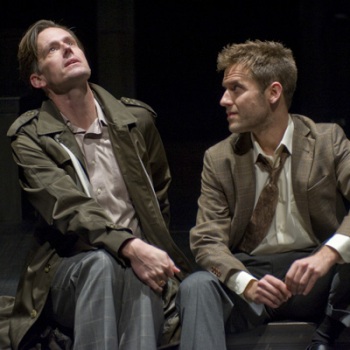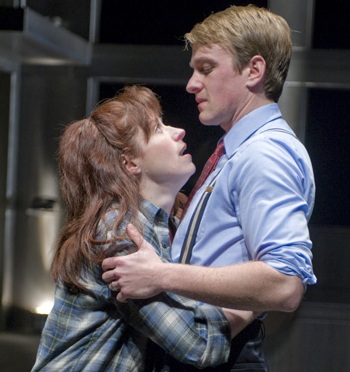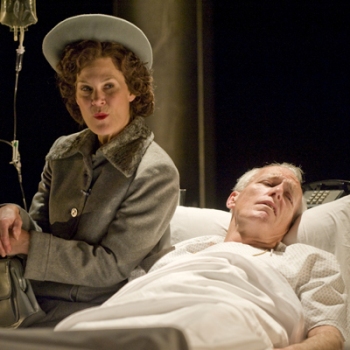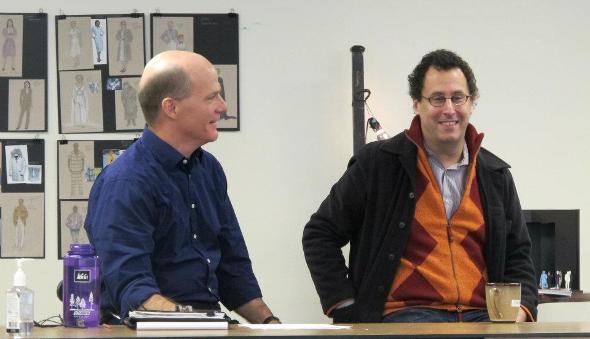‘Angels in America’ at the Court: Viewing AIDS and the yearning heart through a perfect lens
 Review: “Angels in America” by Tony Kushner, at Court Theatre through June 3. *****
Review: “Angels in America” by Tony Kushner, at Court Theatre through June 3. *****
By Lawrence B. Johnson
Tony Kushner’s “Angels in America,” a seven-hour epic theater piece as structurally complex as it is culturally resonant and emotionally fraught, requires just two things to succeed on the stage: a perfectly tuned cast of eight actors playing multiple roles and a visionary director to tune them. Behold: I give you Court Theatre’s inspiring achievement directed by Charles Newell.
 While there is much – actually, everything – to admire in Court’s monumental, witty and touching production, it is the guiding hand of Newell, the company’s artistic director, that assures this enterprise its human form and pulse. I’m not tossing out vague praise when I call Newell’s concept visionary, for the two plays that combine to make the grand tapestry of “Angels in America” specifically asks for uncommon imagination. Kushner’s subtitled the work “A Gay Fantasia on National Themes.”
While there is much – actually, everything – to admire in Court’s monumental, witty and touching production, it is the guiding hand of Newell, the company’s artistic director, that assures this enterprise its human form and pulse. I’m not tossing out vague praise when I call Newell’s concept visionary, for the two plays that combine to make the grand tapestry of “Angels in America” specifically asks for uncommon imagination. Kushner’s subtitled the work “A Gay Fantasia on National Themes.”
Fantasy lies at the generous heart of “Angels in America.” Though a play of its time – the AIDS-plagued ‘80s when being gay was reality crushed into a closet – it still exudes a compelling freshness and relevance, as a gay anthem sounded in counterpoint to other enduring “national themes” such as racism, political corruption and the lust for power. It is a hymn to gay men, a dialectical poem as convoluted and bizarre and dark as Baudelaire’s “Fleurs du mal,” about love, illness, madness and death. And angels.
 Angels loom large and brilliantly in this vision of contemporary America, where the last reported angel citing happened in the 1820s to Joseph Smith, the founder of Mormonism. Indeed, Mormons also figure prominently in Kushner’s free-wheeling portrait of gay life in America – New York, really, though Salt Lake City gets drawn into it and San Francisco is held up as the very model of heaven. Does that sound funny? It’s screamingly funny. Court’s opening night audience was in surgical stitches.
Angels loom large and brilliantly in this vision of contemporary America, where the last reported angel citing happened in the 1820s to Joseph Smith, the founder of Mormonism. Indeed, Mormons also figure prominently in Kushner’s free-wheeling portrait of gay life in America – New York, really, though Salt Lake City gets drawn into it and San Francisco is held up as the very model of heaven. Does that sound funny? It’s screamingly funny. Court’s opening night audience was in surgical stitches.
Yet “Angels in America” is serious comedy, riotous in its pain and tragedy. The two closely linked parts – “Millennium Approaches” and “Perestroika” – also form a masterpiece of keenly honed speech that Newell’s cast elevates to a fine pitch of musicality and nuance. To love language is to sit transfixed through these seven hours of raillery, agony, protestations and delusions.
 The story interlaces the lives of several gay men (along with a few women and that wacky angel) caught up in the AIDS terror. Priority implicitly belongs to Prior Walter (played with excruciating openness and fear by Rob Lindley), who learns he’s infected only to be abandoned by his boyfriend Louis, a glib intellectual who runs his mouth on any subject but can’t summon much moral integrity. Eddie Bennett’s narcissistic Louis is the kind of character you love to despise.
The story interlaces the lives of several gay men (along with a few women and that wacky angel) caught up in the AIDS terror. Priority implicitly belongs to Prior Walter (played with excruciating openness and fear by Rob Lindley), who learns he’s infected only to be abandoned by his boyfriend Louis, a glib intellectual who runs his mouth on any subject but can’t summon much moral integrity. Eddie Bennett’s narcissistic Louis is the kind of character you love to despise.
Ah, but he pales in our disdain compared with iron-fisted, take-no-prisoners lawyer Roy Cohn, a deeply closeted gay who orders his doctor to label his AIDS infection as liver cancer. Larry Yando’s smarmy, power-mad Cohn commands the stage even when he’s bed-ridden, which is more than half of those seven hours. Cohn’s protégé, Joe Pitt, is a young Mormon lawyer, married, whose homosexuality is buttoned up to his neck. Geoff Packard pulls off a double coup in playing Joe’s increasing attraction to rebounding Louis on the one hand while, on the other, trying to preserve his charade of a marriage to Harper, a valium-popping psychotic who enjoys little imaginary getaways.
 Not surprisingly, Harper (infected with loopy misery by Heidi Kettenring) pleads that she’s sex starved. Will she, six and a half hours in, prove to be the together little wife Joe knows he needs? Only an angel could know, and I’m not there yet.
Not surprisingly, Harper (infected with loopy misery by Heidi Kettenring) pleads that she’s sex starved. Will she, six and a half hours in, prove to be the together little wife Joe knows he needs? Only an angel could know, and I’m not there yet.
Actually, two mortal angels of mercy walk among these frail souls: Belize, a black ex-drag queen turned nurse, ends up taking care of both Prior (with great sympathy) and Cohn (with supreme reluctance). Michael Pogue’s good-hearted but importuned Belize is a crazy delight, and his rancorous exchanges with Yando’s racist, presumptuous – dying! — and ever ungrateful Cohn are peak moments of the show.
In more muted fashion, Hollis Resnik also touches the heart as Joe’s Mormon mother Hannah, who reels when he comes out to her at the most improbable moment, then bolts from Salt Lake City to encounter the remote world of New York and the depth of her own humanity. Wearing a different hat, Resnik also portrays the ghost of executed spy Ethel Rosenberg, who regularly visits her old (indeed historical) nemesis Cohn on his deathbed with updates on his disbarment hearing.
 Finally, the Angel. Emissary of a God who has perhaps abandoned her kind, she is the bearer of wisdom and vision – not to mention great sex – to the languishing Prior. Mary Beth Fisher is the flying phantom, whom only Prior sees, anyway until around hour six. Fisher’s eye-popping Angel also has one foot in comedy as she veers from grandiose rhetoric to out-of-character one-liners when the mission takes a bad turn.
Finally, the Angel. Emissary of a God who has perhaps abandoned her kind, she is the bearer of wisdom and vision – not to mention great sex – to the languishing Prior. Mary Beth Fisher is the flying phantom, whom only Prior sees, anyway until around hour six. Fisher’s eye-popping Angel also has one foot in comedy as she veers from grandiose rhetoric to out-of-character one-liners when the mission takes a bad turn.
The finesse of director Charles Newell’s hand is pervasive over a long haul that, in its fluent stagecraft, seems to fly by. Scenes flow without break on and around the central hospital set. The action spills into the aisles, and hallucinations mingle with reality in a seamless continuum. Never for a moment does Newell drop the thread of Kushner’s intricate narrative.
There are two flashes of male nudity and one instance, upstage, of sex between men, though it doesn’t work out very well and ends up being more amusing than salacious. Indeed, this intimate epic about homosexual relationships and the horror of AIDS rarely even hints at sex, though it abounds in love and plain frantic need.
John Culbert’s grand yet spare set, a central bed in front of a multilevel grid that serves as heaven — and/or San Francisco – provides an ample forum for Kushner’s multifaceted play. Costume designer Nan Cibula-Jenkins drew the plum assignment of the season, in the Angel’s flowing robes, and came through with streaming colors.
Related Links:
- Performance location, dates and times: Go to TheatreinChicago.com
- Tony Kushner on responsibility of the playwright: Watch it on YouTube
- Marcia Gay Harden remembers originating the role of Harper Pitt on Broadway: Watch it on YouTube
- Quotations from “Angels in America”: Sample them at Goodreads
- Coverage of the Broadway 1993 opening of Part 1 (“Millennium Approaches”): Go back in the New York Times
- “Angels” as classic theater: Commentary by Shakespeare scholar David Bevington
- Photos from the past: View images from 15 previous productions
- Roy Cohn remembered: Read the Life Magazine obit
- “Angels in America” was a 2003 HBO movie: Find it on DVD
Photo captions and credits: Home page and top: Prior Walker (Rob Lindley) examines the book of prophecy and wisdom conveyed to him by the Angel (Mary Beth Fisher). Descending: Lawyer Roy Cohn (Larry Yando) advises his young protege Joe Pitt (Geoff Packard). Prior Walter (Rob Lindley, left) breaks the news that he has AIDS to his lover Louis (Eddie Bennett). Harper and Joe Pitt (Heidi Kettenring and Geoff Packard) struggle with their marriage. Prior Walter (Rob Lindley, seated) receives treatment for AIDS from nurse Belize (Michael Pogue). Executed Soviet spy Ethel Rosenberg (Hollis Resnik) comes back from the dead to haunt terminally ill Roy Cohn (Larry Yando). Below upper: The Angel (Mary Beth Fisher) comforts AIDS-stricken Walter Prior (Rob Lindley). Below lower: Director Charles Newell and playwright Tony Kushner discuss “Angels in America.” (Photos by Michael Brosilow)
Tags: "Angels in America", Charles Newell, Eddie Bennett, Geoff Packard, Heidi Kettenring, Hollis Resnik, John Culbert, Larry Yando, Mary Beth Fisher, Michael Pogue, Nan Cibula-Jenkins, Rob Lindley, Tony Kushner



